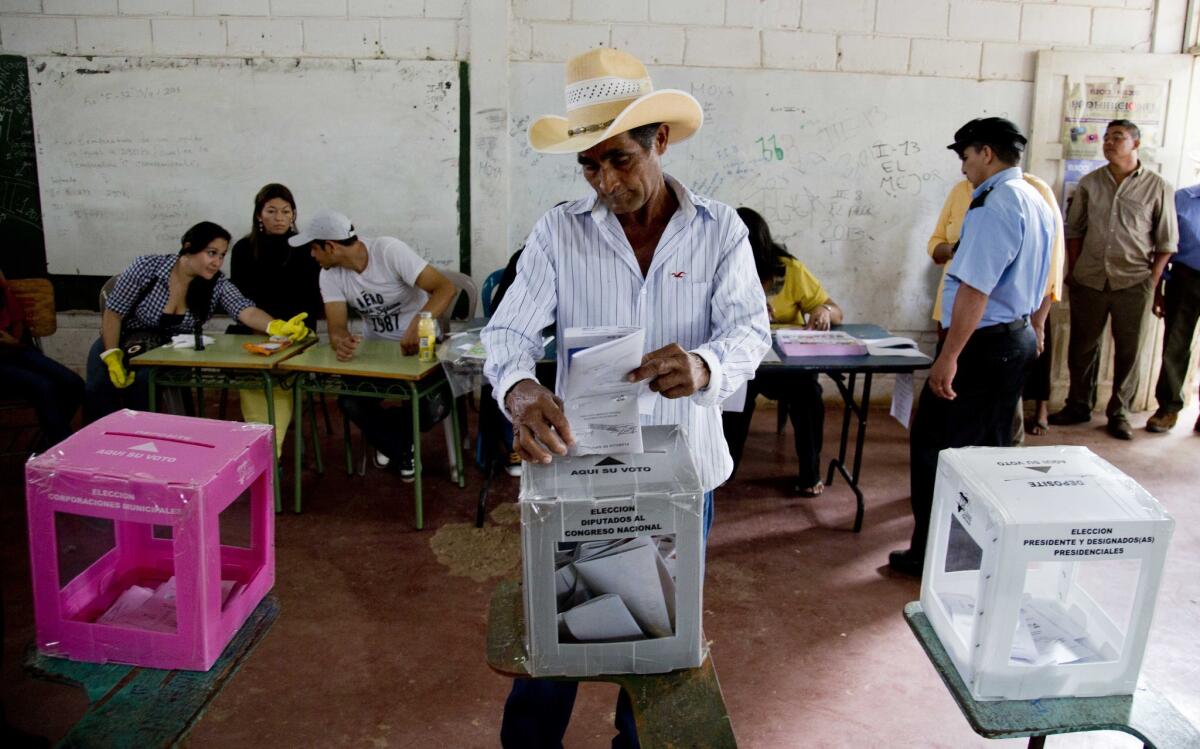Honduras: Voters face historic choice against troubled backdrop

TEGUCIGALPA, Honduras â Hondurans were voting for president Sunday, choosing from the most diverse slate of candidates in national history but in an election overshadowed by deadly violence and endemic poverty.
Voters overwhelmingly said they hoped the next government would radically change the country, still reeling from the devastation of a military coup in 2009, although there was wide disagreement on how and who could best do it.
Mayra Valladares, a 66-year-old homemaker, said she cast her ballot for the ruling National Partyâs Juan Orlando Hernandez because he would be toughest on crime.
âHe works with an iron fist, and thatâs what we need,â said Valladares, whose two nephews were murdered last year.
First-time voter Sarahy Suazo, 18, agreed. âWe need the military in the streets where they can stop crime, not in their barracks,â she said, adding that she was confident the National Party would help her get a job.
Hernandez, until recently president of Congress, created a military police force to combat Hondurasâ runaway homicide rate, winning praise in some sectors but widely condemned by human-rights organizations and pro-democracy groups. He has also been heavy-handed in stacking many of Hondurasâ notoriously corrupt institutions with his supporters and spreading what many here describe as a generalized climate of fear.
In the last publicly available opinion surveys four weeks ago, Hernandez was in a technical tie with contender Xiomara Castro, leader of a new left-leaning party and wife of Manuel Zelaya, the president overthrown in a 2009 coup.
âThe crisis in Honduras is of unprecedented proportions and has turned us into a failed state,â said Jose Ochoa y Martinez, 71, after voting at a school near the central market in downtown Tegucigalpa. âParts of Honduras are practically feudal, and whatever we do today wonât change things, our reality is so dramatic.â
Still, the retired television broadcaster said he was voting for Castro as the beginning of hope for change.
Jorge Mendez was having none of it. The out-of-work former police officer said he was sick of all politicians and would not vote. âItâs all lies,â he said. âJuan Orlando didnât solve any problems while he was head of Congress, and Xiomara may have good intentions but the powerful families who control Honduras wonât let her govern.â
Honduras has been dominated by two parties, the National and the Liberal, often in cahoots with the military, for most of its political history. This is the first election with a formidable opposition, Castroâs Libre (âFreeâ) Party, along with an array of smaller groups, all fielding hundreds of candidates for the legislature and city halls.
âPeople are out and voting massively, despite all the fear everyone had,â Castro told reporters just before marking her ballot, Zelaya at her side. Her critics have contended she is just a front for the controversial former president.
Although the Liberal Partyâs candidate, Mauricio Villeda, has lagged in the polls, he got Gloria Becerraâs vote. âHeâs the most honest of the lot,â said the 78-year-old homemaker, who bore a bruise on her face from a mugging two days earlier. The attacker knocked her to the ground and stole her change purse. âI battled and battled but he finally got it.â He made off with the equivalent of $25.
At voting stations in the wealthier enclaves of Tegucigalpa, where houses sit behind high walls and bodyguards were whispering into their radios while their bosses cast ballots, there was even support for one of the more unlikely candidates, Romeo Vasquez, the former army general who helped stage the coup.
âPeople want change, and I am completely fed up with the politicians,â said Carlos Rodriguez, 63, an agronomist and evangelical preacher dressed in a robinâs-egg blue sports shirt with a logo saying, âBeverly Hills Polo Club.â âSo Iâm voting for the general not so much because he is a military man but because he is not a politician.â
By midday Sunday, the elections were proceeding relatively peacefully. A handful of incidents was reported nationwide, including vote-buying, paperwork foul-ups, intimidation and the shooting of two Libre Party poll workers.
There has been widespread concern that if the results in the presidential race are extremely close, or that if the vote is seen as unfair, a wave of violence could follow that would throw the impoverished country into even greater turmoil.
âOur biggest fear has been that the results will be disputed and passions will overflow into the streets,â said Jennifer McCoy, head of the Americas division of the Carter Center, one of dozens of groups here to monitor the election.
ALSO:
Iranâs leaders call nuclear deal a success
Afghan council defies Karzai on U.S. security deal
Rich-vs.-poor nationsâ clash stalls work toward 2015 climate pact
More to Read
Sign up for Essential California
The most important California stories and recommendations in your inbox every morning.
You may occasionally receive promotional content from the Los Angeles Times.











